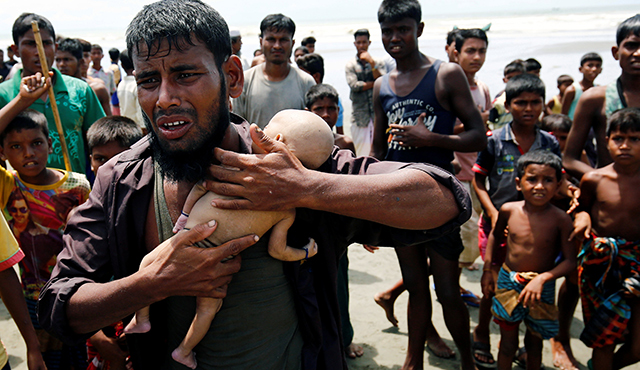NEW YORK (CNS) — Humanitarian organizations and host countries struggle to develop new ways to address both immediate and long-term needs of an unprecedented number of people who have fled conflict situations around the globe, according to panelists at a Sept. 21 aid agency forum in New York.
The U.N. High Commissioner for Refugees estimates more than 65 million people worldwide were forcibly displaced from their homes by the end of 2016 as a result of persecution, conflict, violence or human rights violations. This is an increase of 300,000 from the previous year. The record high number includes more than 40 million people displaced within their own countries.
Bill O’Keefe, vice president for government relations and advocacy for Catholic Relief Services, said the “average refugee” can expect to spend up to 25 years in that situation and the countries that host refugees are predominantly low- and middle-income nations.
Speaking at the Church Center of the United Nations, with the iconic international complex clearly visible through the huge windows behind them, panelists described recent efforts to institute systemic reforms while responding to challenging day-to-day needs of a growing displaced population.
Education is a life-saving intervention, like food, water and shelter, and it is critical to get displaced children back in school as soon as possible, Giulia McPherson said. She is the director of advocacy and operations for Jesuit Refugee Services/USA.
McPherson said one in four children globally are affected by crisis and conflict, and refugee children are five times more likely to be out of school than others their age. They also experience learning gaps caused by losing two to four years of schooling.
Education must be an integral part of developing a plan to receive refugees in a host country, McPherson said. In the experience of JRS, recruitment of teachers from the refugee community and investment in teacher training and materials produce good outcomes for students, as does helping refugees to establish parent-teacher associations and student organizations, she said.
Ideally, displaced students use the curriculum of the country where they are hosted, not where they originated. This prepares them for possible inclusion in the national educational system if they cannot or do not return home, McPherson said.
Speakers said involving both refugees and members of the host community is critical to the safety and success of displaced persons.
“Social connections and acceptance are key components of a refugee’s integration process and should be prioritized in programming and policy development,” said Jennifer Poidatz, vice president for humanitarian response for CRS, the U.S. bishops’ overseas relief and development agency based in Baltimore.
Discrimination, restrictive policies and the real or perceived competition for finite resources must be addressed, she said.
“We need to understand and respond to the concerns of the host community, combat stereotypes, and promote awareness. As social acceptance increases, so does a willingness to share resources and information, such as employment opportunities,” Poidatz said.
CRS has used puppetry in films and workshops to create a dialogue within the host population and help build relationships in tense situations. Film, theater and puppetry are methodologies to tell refugee stories and break down stereotypes, she said.
The agency’s programs target vulnerable displaced people and support host communities, Poidatz said. Aid workers need different competencies for various situations, and must try to understand cultural norms and recognize and address trauma.
In a refugee situation in Greece, Poidatz said, CRS brought members of its national staff from Afghanistan and Balkan countries to interpret the language and share the cultural context of people arriving in Greece from those countries.
Brooke Lauten, humanitarian policy and protection adviser for the Norwegian Refugee Council, said nongovernmental organizations are making strides to ensure that refugees and internally displaced people are actively involved in planning programs from which they benefit. In the past, they were not consulted about their needs and wants, she said.
In addition to prioritizing the protection of refugees and promoting better opportunities, Lauten said attention must be paid to the details of how programs are implemented. Winning an increase in work permits is not helpful if there are no jobs. People cannot be resettled in third countries if their “onward movement” is blocked.
Ultimately, political commitment on a regional scale supports safety and mobility and helps to “avoid a crisis level of need,” she said.
Lauten said a 2016 initiative by the government of Kenya to send refugees home to neighboring Somalia was postponed after international organizations protested because Somalia was enduring a drought.
Richard Corbridge, director of international programs for War Child in Canada, said displaced people need access to justice and the rule of law to ensure their safety. Refugee women and girls are especially vulnerable and are more affected by violence than any other population, he said. Dialogue and mediation are peacebuilding tools that War Child has used to foster mutual understanding, particularly among youths.
O’Keefe noted the Sept. 27 launch by Pope Francis of Share the Journey, a two-year global campaign led by Caritas Internationalis to raise the status of refugees around the world by strengthening bonds between migrants and communities.
“The refugee advocacy and service community has come together incredibly strongly for this,” he said. “The refugees among us are not the problem. They are fleeing the people we should be afraid of.”
“Welcoming the Stranger: Making Lives Better for Refugees in Host Countries” was co-sponsored by Caritas Internationalis and Catholic Relief Services as a side event to the 72nd session of the U.N. General Assembly. It drew on documents and agreements from the U.N. World Humanitarian Summit in May 2016 and the UNHCR Summit for Refugees and Migrants in September 2016.

